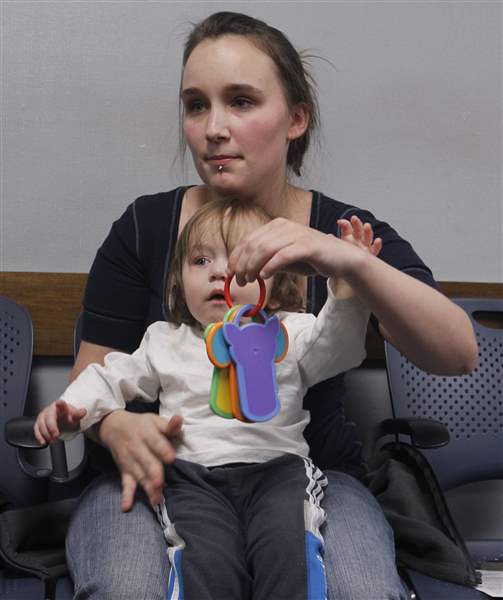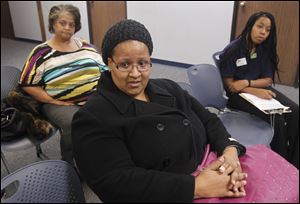
STATE LEGISLATION
Drug tests for welfare recipients weighed
Multicounty effort proposed for Ohio
12/16/2012
Lindsay Heffner, 21, with her son Evan Rice, 10 months, says she disagrees with part of a bill that would require drug testing for those on public aid.
The Blade/Lori King
Buy This Image

Lindsay Heffner, 21, with her son Evan Rice, 10 months, says she disagrees with part of a bill that would require drug testing for those on public aid.
Ohio is weighing a pilot program in several counties that would require drug testing for some people receiving welfare benefits.
The bill, which had a committee hearing this month, is not expected to pass in the lame-duck session of the legislature but is likely to be reintroduced next year. If passed, it could face legal challenges from critics who say it unfairly penalizes people in need.
“The drug epidemic is tearing our families apart. And if taxpayer dollars are fueling it, we’ve got to bring it to a stop,” said state Sen. Tim Schaffer (R., Lancaster), who introduced the legislation.
Although drug testing for public-assistance recipients has been discussed in a number of legislatures in recent years, only a handful of states have enacted broad legislation.
More than 30 states have had some sort of proposal or bill about drug-testing welfare recipients, said Liz Schott, a senior fellow at the Center on Budget and Policy Priorities, a Washington think tank that studies issues affecting low-income people.
The administrative costs of testing and the likelihood that an overly broad test will be challenged in court has given some states pause, said Elizabeth Lower-Basch, a senior policy analyst at CLASP, a national nonprofit group that promotes policy ideas for those who have low-income.
Courts halted a Michigan drug-testing program in 2003, and a similar law in Florida was declared unconstitutional this year. The Florida case is pending in a federal appeals court.

Regina Willis, 34, of Toledo, center, who is not on welfare, says that she thinks it's fair to expect welfare recipients to undergo testing for drug use. 'When you go for a job, you have to do a drug test,' she said.
Both of these laws called for drug testing of all welfare applicants, which is much broader than what is being proposed in Ohio.
“We learned from their lesson,” Mr. Schaffer said, referring to those court challenges.
Under Mr. Schaffer’s proposal, only individuals who admit to using drugs in the past six months would be subject to a test.
The Ohio Poverty Law Center and American Civil Liberties Union probably would pursue a legal challenge if the Ohio legislation in its current form is enacted, said Eugene King, director of the Ohio Poverty Law Center.
“Drug abuse is bad,” Mr. King said. “But this bill doesn’t address drug abuse. And it hurts low-income people.” He said the bill could be challenged on several legal grounds, including the provision that applicants would have to pay for their own tests.
“Well, people come to apply for cash assistance because they are broke,” he said.
The Ohio proposal would call for those who test positive for drugs to be referred for treatment, with the ability to reapply in six months. If they don’t go to treatment, they would be ineligible.
A family could receive benefits through a third party during the period.
Deb Ortiz-Flores, head of the Lucas County Job and Family Services Agency, said she is concerned about unfunded administrative requirements that could make such a law burdensome for her agency and others across the state to administer.
Currently, there is no formal process by which applicants are asked about drug use, said Ben Johnson, spokesman for the Ohio Department of Job and Family Services. However, if county caseworkers suspect that drug or alcohol abuse presents a barrier to employment and self-sufficiency, they may refer an individual to treatment, he said.
Statewide, agency directors are split on the issue, said Joel Potts, executive director of the Ohio Department of Job and Family Services Directors’ Association.
Opinions also vary among those who would potentially be subject to such a test.
“I think it’s fair,” said Regina Willis, 34, of Toledo, who was at the Lucas County Job and Family Services office on Monroe Street last week to check on paperwork for her Medicaid benefits. “When you go for a job, you have to do a drug test.” Ms. Willis does not receive welfare, although she received it in the past for less than a year, she said.

Alethea Braswell, 32, says requiring welfare recipients to undergo testing for drug use is unfair because the number of drug users on welfare is small.
Alethea Braswell, 32, who was at the office to recertify her food and medical benefits, disagreed. “There [are] some people that do have drug problems [on assistance],” she said. “But it’s not a lot. ... It’s not fair for the people who really need the help.”
Lindsay Heffner, 21, who receives cash assistance through a work-education program, said she thinks the potential testing is fair, although she disagrees with the provision that would require applicants to pay for their own drug tests and not be reimbursed if they do not test positive for drug use.
“If you can afford to buy your drugs, there’s no reason why you should have welfare,” she said.
Mr. Schaffer said his proposal also provides $100,000 statewide for drug treatment. The counties where the pilot would be enacted have yet to be determined, although they will be a mix of rural and urban areas, he said.
Welfare, also known by its official name, Temporary Assistance to Needy Families, has a relatively small number of recipients statewide, compared with other assistance programs, such as food stamps or Medicaid. In Lucas County, a total of about 8,700 children and adults receive welfare, compared with 91,000 receiving food assistance. The bill applies only to welfare applicants, not to people receiving only food stamps or Medicaid.
Research does not indicate greater drug abuse among welfare recipients than among the general population, Ms. Schott said.
“If the focus were really about addressing substance abuse you wouldn’t approach this with a drug-testing framework, but rather with a screening assessing and providing treatment approach,” she said. The focus on drug testing bills suggests that the intention of the legislation is more about undermining public support for these programs, she said.
Futhermore, Ohio’s welfare caseload has plummeted by more than one-third since the beginning of last year, so lowering the number of new applicants seems unnecessary, she said. The number enrolled declined to about 148,000 in August, the most recent statistics available, from approximately 226,000 in January, 2011. Most of those enrolled in the program were children; as of August, only about 32,000 statewide were adults.
“The drug testing may be to discourage people,” Ms. Schott said. “But they’re doing a pretty good job of that already.”
Contact Kate Giammarise at: kgiammarise@theblade.com or 419-724-6091, or on Twitter @KateGiammarise.